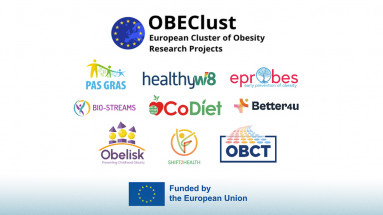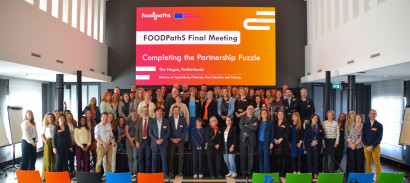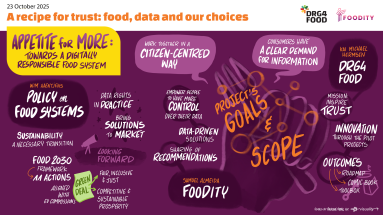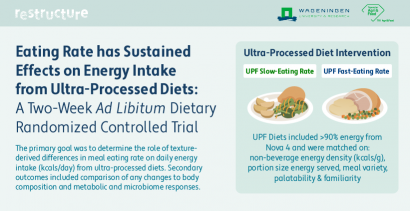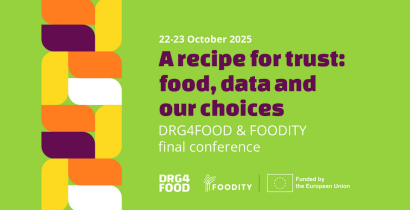Press releases
European obesity research cluster wins EASO Award for collaborative innovation
In occasion of World Obesity Day, the European Cluster of Obesity Research Projects (OBEClust) has been recognised with the EASO Award for Best Collaborative Project at the World Obesity Day Europe Awards 2025.
Infographics About Healthy Eating Can Spark Interest Among Unmotivated Young Adults, New EUFIC Study Finds
Young adults who are not motivated to eat healthily can still be engaged with the right type of communication, according to new research from the European Food Information Council (EUFIC).
FOODPathS Releases Final Recommendations to Accelerate Europe’s Food Systems Transformation
After three and a half years of intensive groundwork, the Horizon Europe project FOODPathS has concluded, leaving behind a strategic legacy designed to accelerate the transformation of Europe’s food systems.
DRG4FOOD delivers 8 food tech innovations that put consumer trust first
In an era where consumers are increasingly wary of how their food data is used, the EU-funded DRG4FOOD project has delivered a solution: 8 digital food innovations that foster trust alongside technological advancement.
Fibre in focus: EUFIC calls on Europeans to make the #SwitchToWholeGrains for better health
This November, the European Food Information Council (EUFIC) is relaunching its expanded #SwitchToWholeGrains campaign to help Europeans close the fibre gap and make healthier grain choices!
88% of nutrition professionals in Spain agree: plant-based dairy alternatives can be part of a healthy diet, but call for clearer guidance
A new survey conducted by the EUFIC reveals strong support among nutrition professionals in Spain for plant-based dairy alternatives (PBDAs), such as drinks and yoghurts made of legumes (e.g., soy), oats, nuts (e.g., almonds), rice, or coconut, with 88% agreeing that these plant-based alternatives can be part of a healthy diet. In addition, 78% support the inclusion of PBDAs in Spain’s national dietary guidelines. However, opinions varied on whether dietary guidelines should feature only fortified PBDAs or any version.
93 % dos nutricionistas em Portugal concordam: alternativas vegetais aos laticínios podem fazer parte de uma alimentação saudável, mas apelam a uma orientação mais clara
Um novo inquérito realizado pelo Conselho Europeu de Informação Alimentar (EUFIC) mostra um forte e crescente apoio dos profissionais de nutrição em Portugal às alternativas vegetais aos laticínios, tais como bebidas vegetais e alternativas vegetais ao iogurte, por exemplo, soja, aveia, frutos oleaginosos, arroz ou coco. Com 93% dos profissionais inquiridos a concordar que estas alternativas de base vegetal podem fazer parte de uma dieta saudável. Adicionalmente, 76% apoiam a inclusão de alternativas vegetais aos laticínios nas diretrizes alimentares e recomendações nutricionais nacionais. Dos que apoiam a sua inclusão, 62% são a favor da inclusão apenas das alternativas vegetais aos laticínios fortificados com micronutrientes.
93% of nutrition professionals in Portugal agree: plant-based dairy alternatives can be part of a healthy diet, but call for clearer guidance
A new survey conducted by EUFIC shows strong and growing support among nutrition professionals in Portugal for plant-based dairy alternatives (PBDAs), such as drinks and yoghurts made of legumes (e.g., soy), oats, nuts (e.g., almonds), rice, or coconut, with 93% agreeing that these plant-based alternatives can be part of a healthy diet. In addition, 76% support including PBDAs in the national dietary guidelines. Of those who supported their inclusion, 62% were in favour of including only PBDAs that are fortified with micronutrients.
Eating Rate Has Sustained Effects on Energy Intake From Ultra-Processed Diets, New Study Reveals
A randomized controlled trial (RCT) carried out by researchers from Wageningen University, the Netherlands, has provided new evidence that texture-derived differences in meal eating rate influence energy intake from diets composed of ultra-processed foods (UPFs).
DRG4FOOD & FOODITY Final Conference 2025: A Recipe for Trust in Europe’s Food Future
Take part in the Final Conference of the EU-funded projects DRG4FOOD and FOODITY, taking place at La Tricoterie, Brussels, on 22–23 October 2025, to discover how we can build a food system that citizens trust.
